SUMMARY
This is AI generated summarization, which may have errors. For context, always refer to the full article.
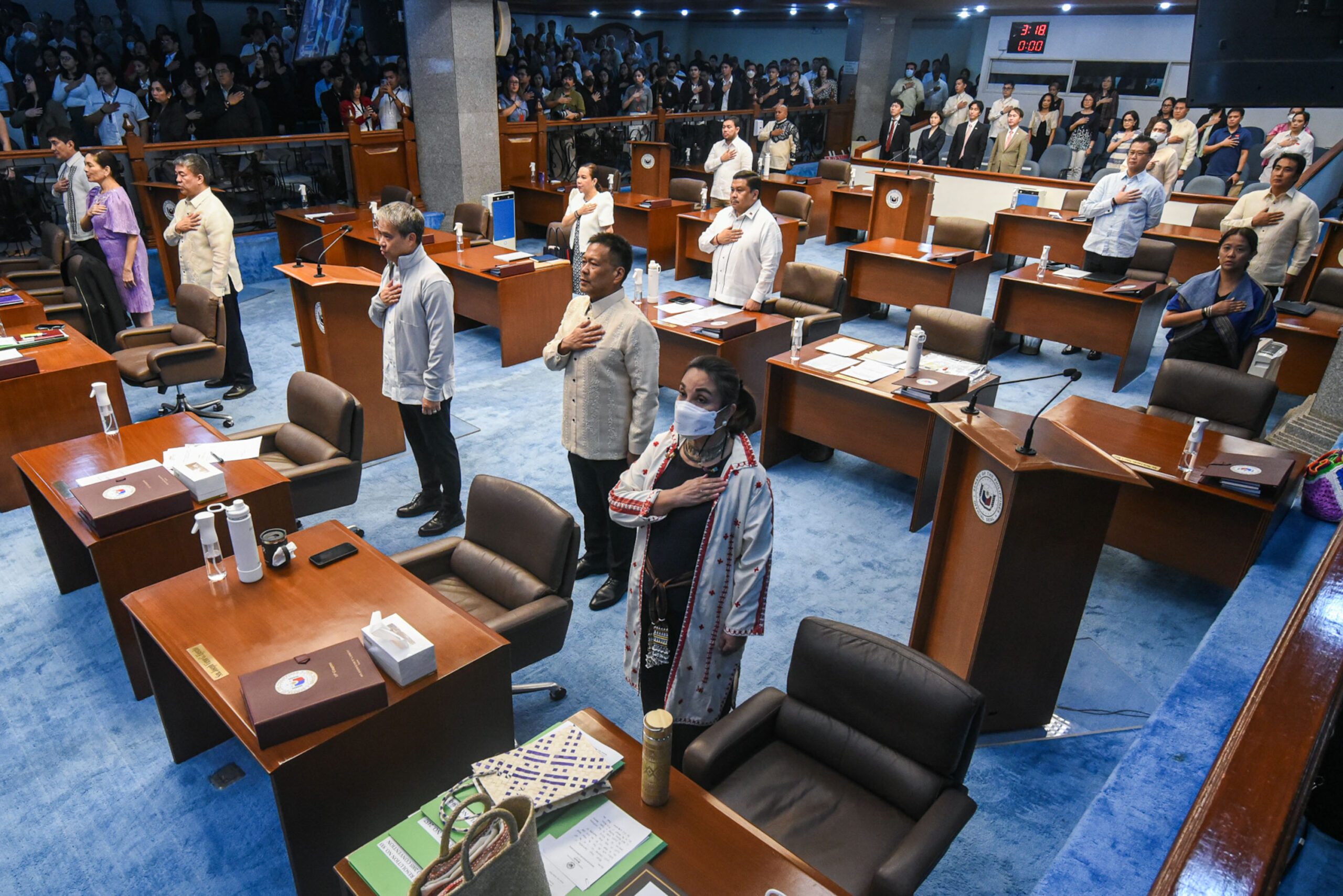
If senators were to vote on the proposed economic amendments to the 1987 Constitution today, the fresh push for charter change would fizzle out for failing to meet the required number of votes from the Senate.
Senate President Juan Miguel “Migz” Zubiri himself considered it a “big challenge.” In the Senate, 18 votes are needed to pass Resolution of Both Houses No. 6 “proposing amendments to certain economic provisions of the 1987 Constitution,” which he co-authored with senators Loren Legarda and Sonny Angara.
Majority vote is needed for the bill to be submitted to a bicameral conference committee before it gets voted on in a plebiscite.
“It’s a challenge, it’s a big challenge because I think the rift between our friends at the House and our friends here at the Senate is a factor because this resulted in trust issues,” Zubiri told reporters in a mix of English and Filipino.
The Senate President is referring to the rift between the two chambers in relation to the push to amend the Constitution. The squabble started when senators signed a manifesto rejecting the House’s new push for charter change, which proposes that both chambers vote jointly on proposed amendments.
Senators want separate voting by the chambers to ensure that their voice is not diluted in the process. Zubiri said that the Senate and its 24 members cannot cast any meaningful vote against the 316 members of the House.
University of the Philippines professor and political analyst Ela Atienza said this is the primary reason why the Senate opposes charter change. “The Senate’s reluctance to back Cha-Cha initiatives is more personal because the House leadership tried to undermine the Senate by pushing for a people’s initiative earlier that will diminish the Senate’s power to vote as a separate chamber in case the two Houses vote on proposed amendments as a constituent assembly.”
Senators echo the concern of many that while proposals to amend the Constitution are focused on economic provisions, no one can stop the inclusion of proposed provisions on term limits and other political provisions. They fear that the Senate will be abolished if political amendments, such as a shift to a unicameral parliamentary form of government, will be introduced.
The Senate is currently deliberating on RBH6. Meanwhile, the House already wrapped up its version, RBH7, in just six days. The House version mirrors the Senate’s which allows foreign investments in the country’s public utilities, education, and advertising sectors.
The two differ though in one contentious line that says “each House vote separately” on the amendments.

Angara, who chairs the Senate subcommittee on amendments and revision of codes, had said that the upper chamber would likely finish their discussions by October.
The dissenters
Although it’s not up for voting yet, some senators already said that they are voting against RBH6.
At a press conference on Monday, March 11, Deputy Minority Leader Risa Hontiveros said they have a “fighting chance” to gather at least seven votes to “put down” RBH6. She said that she could sense that the no vote on RBH6 would not be limited to the two members of the Senate minority.
“Batay sa sense namin sa minority na hindi lamang kaming dalawa ang magno-no sa Cha-Cha. Kahit ‘yung Resolution of Both Houses 6 dito sa Senado, mula sa halos simula ng pag-uusap namin ni SP, alam na nila na no talaga ang posisyon ko kahit sa sinasabing economic only provisions amendments na nakapaloob sa RBH 6,” she said.
(Our sense in the minority is that we’re not the only ones who will say no to Cha-Cha. Even the Resolution of Both Houses No. 6 here at the Senate, ever since the start of our discussions with the Senate President, he knows my “no” position even on the economic only provisions included in the RBH6 is firm.)
In a statement on Monday, Senate Minority Leader Aquilino “Koko” Pimentel III said that President Ferdinand Marcos Jr.’s possible intervention in RBH6 will only “help a little.” He earlier claimed that he and eight other senators were ready to vote against RBH6.
“The credibility of the President among senators has fallen to an all-time low when it comes to the subject matter of charter change. Hence, presidential endorsement may help the proponents of Senate RBH 6 but only a little. Everything that the President says will be taken with ‘a grain of salt,'” he said.
Apart from the two-member minority bloc, Senator Cynthia Villar already expressed her opposition to RBH6, noting that “there was a chance” that seven senators, including herself, would vote “No” on the bill.
“They claim they are only after the economic provisions. But when they open up the Constitution, nobody can stop them from changing other provisions, including the political portions. That’s not good,” she said. Political observers said that Senator Cynthia would likely influence her son, Senator Mark Villar.
Meanwhile, presidential sister Senator Imee Marcos has been very vocal about her dissenting opinion on charter change. She had led a Senate inquiry into alleged bribery in the push to secure signatures to amend the charter through a supposed people’s initiative.
Before the Senate started deliberating on RBH6, Majority Leader Joel Villanueva claimed that “a lot of senators” were not interested in supporting RBH No. 6 filed by Zubiri. He was also among the senators who had traded barbs with House members in relation to charter change via people’s initiative.
Rappler reached out to Villanueva to ask whether his position on the issue has changed or not, but he has yet to reply as of posting.
In February, Senator Nancy Binay said that proposed economic amendments to the charter are “not a magic solution” as she urged her fellow lawmakers and the public to “carefully listen to all perspectives before making any decisions regarding the proposed constitutional amendments.”
“Base sa unang hearing, parang mas marami kaming naging resource persons na mas mabigat ang hindi muna napapanahon ang pagpalit ng ating Konstitusyon,” Binay said.
(Based on our first hearing, it seems that most of our resource persons are strongly against constitutional amendments at this time.)
If all these seven senators vote against RBH6, then the push for charter change will be junked. For Zubiri, forcing senators to vote “yes” to RBH6 will mean losing his Senate leadership.
“Alam mo ‘pag inutusan ko sila gawin ‘yan mawawala talaga ako as Senate president, (You know, if I force them to vote yes to charter change, I really will no longer be Senate president) I will no longer have the trust and confidence of more than 14 senators if I force a vote, force them to vote on the affirmative,” Zubiri said, referring to the 14 senators who signed a manifesto of support for his leadership amid ouster rumors.
‘Senate independence’
Political analyst Cleve Arguelles said that this development from the upper chamber is a manifestation of the “nature of the Senate of being more independent of Malacañang’s wishes than its counterpart in Batasan.”
“Senators, like the President, also enjoy a national constituency, mandate, and support. I think this is very important in their ability to counterbalance the weight of the combined influence of the House and Malacañang,” Arguelles said.
But is it really about the Senate reflecting its independence from the executive branch? Or is it because the senators will be at a disadvantage in case charter change pushes through? Like other elective officials, senators are keenly aware of the consequences of supporting unpopular measures.
“They’re also presidents and vice presidents in waiting whose choices now may influence public support for them in the future,” Arguelles said.
Remember when senators railroaded the passage of Maharlika bill at the pleasure of the President? In May 2023, the Senate swiftly passed Senate Bill No. 2020, or the proposed Maharlika Investment Fund Act of 2023. Their vote came after an 11-hour plenary session that saw senators scrambling to pass the priority legislation of the Marcos administration. Prior to its passage, the President had already boasted about this bill during his trips abroad.
The Senate took a beating from the railroaded passage of the controversial measure. With the 2025 elections just around the corner, and with the 2028 elections not too far away, lawmakers are weighing all decisions that could affect public favor.
A survey conducted by pollster Octa Research in December 2023 and released in January 2024 found that only one in every 100 Filipinos identified charter change as an urgent national concern. The top concern of Filipinos is fighting inflation.
Another factor at play in the charter change discussion is the political influence of popular figures, such as former president Rodrigo Duterte and daughter Vice President Sara Duterte, who are both opposed to charter change. The Duterte family even held a prayer rally against the push to amend the 1987 Constitution under the Marcos administration in Davao City.
Some senators are close allies of the Dutertes, among them, senators Bong Go, Bato dela Rosa, and Francis Tolentino.
But in Philippine politics, the unexpected is a given. With the Senate seen to end deliberations on RBH6 in October, will the proponents get the needed votes? Or will more senators end up voting against charter change? – Rappler.com
Add a comment
How does this make you feel?
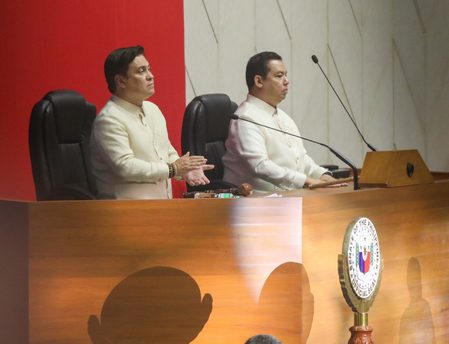
![[WATCH] In the Public Square with John Nery: The political math of charter change](https://www.rappler.com/tachyon/2024/03/pubsq-sq.jpg?resize=257%2C257&crop=400px%2C0px%2C1080px%2C1080px)
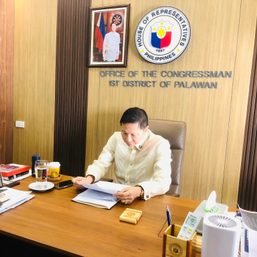
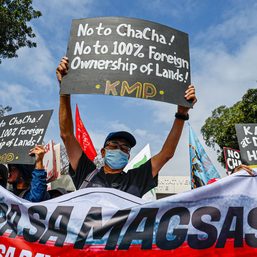
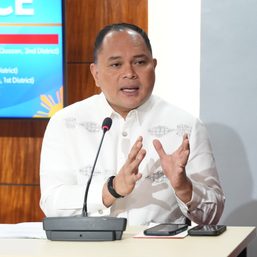
![[Bodymind] The absurdity of Robin Padilla](https://www.rappler.com/tachyon/2024/03/robin-padilla-quiboloy-mar-9-2024.jpg?resize=257%2C257&crop=267px%2C0px%2C720px%2C720px)
![[OPINION] Senators won’t Cha-Cha with Zubiri?](https://www.rappler.com/tachyon/2024/01/Senators-Cha-cha-Zubiri-January-23-2024.jpg?resize=257%2C257&crop_strategy=attention)
![[EDITORIAL] Justice, Philippine style: Acquitted sa plunder, pero may kabig naman](https://www.rappler.com/tachyon/2024/01/animated-jinggoy-estrada-acquittal-carousel.jpg?resize=257%2C257&crop_strategy=attention)


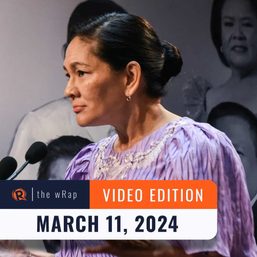
![[Free to Disagree] Arrest Quiboloy!](https://www.rappler.com/tachyon/2024/03/Free-to-disagree-arrest-quiboloy-March-11-2024-1.jpg?resize=257%2C257&crop_strategy=attention)
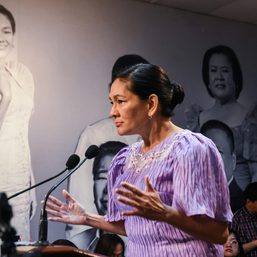
There are no comments yet. Add your comment to start the conversation.